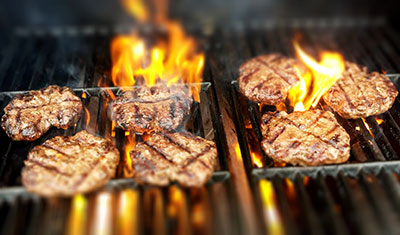Beware of dangers that can dethrone you as Master of the Grill

Summer time is a time for men to become reconnected with their grill. Yet, how many times has the man of the house doused charcoal with lighter fluid to make it light faster? Flames fly off the grill with him standing inches away. When you think of men’s health, beware that the grilling too can be deceptive and cause serious health injuries.
This favorite American pastime results in more than 7,000 gas grill fires, more than
1,200 charcoal grill fires and around 18,000 hospital visits each year.
Sharmila Dissanaike, M.D., Texas Tech Physicians — Surgery, said burn injuries from
grilling are quite common but can be avoided.
“If you are in a rush, many accidents happen. If the Lubbock wind blows out your flame and you attempt to restart a grill the second time without turning off the gas first, the propane or fuel starts to pool. When a person reignites it, an explosion can occur,” Dissanaike said. “One-third of injuries occur when a person is igniting the grill. If you can’t get it lit or re-lit immediately, turn off the fuel and wait 5 minutes before starting it again.”
Dissanaike said to always keep your grill clean, not only because of food safety issues, but also because grease build-up can cause flare-ups and result in fires. Make sure to clean the grill properly and check all of the connections, hoses and tubes. Running soapy water over the hoses can help you detect gas leaks by the presence of bubbles. Worn or rusted connectors should be replaced.
“Maintain your gas grill by keeping it clean and also checking for leaks coming from the hose,” Dissanaike said. “If you smell a leak, turn everything off and have someone check it out. Never use a grill indoors because carbon monoxide poisoning can occur if you are in an enclosed space, especially with charcoal grills.”
Dissanaike also gives these safety warnings:
- Keep children away from hot grills. A quarter of injuries are children who bump into grills.
- If you do not have a fire extinguisher, always have a bucket of sand and some baking soda near by to put out a fire.
- Never throw lighter fluid, gasoline or kerosene on any grill to make it light.
- Never use any grill indoors, and be at least 10 feet away from building structures.
- Use long utensils.
- Make sure your clothing cannot get caught on the grill.
- Check all hoses and connections for leaks or obstructions. Bugs can crawl into pipes, so keep your grill covered when not in use.
“If you grill, know the safety issues that can prevent injuries to you and your family,” Dissanaike said. “An accident can happen so quickly. By taking precautions, you can enjoy a great summer.”
Related Stories
Celebrating Veterans: TTUHSC’s General Martin Clay’s Legacy of Service and Leadership
From his initial enlistment in the Army National Guard 36 years ago to his leadership in military and civilian health care management roles, Major General Martin Clay’s career has been shaped by adaptability, mission focus and service to others.
Texas Tech University Health Sciences Center School of Nursing Named Best Accelerated Bachelor of Science in Nursing Program in Texas
The TTUHSC School of Nursing Accelerated Bachelor of Science in Nursing (BSN) program has been ranked the No. 1 accelerated nursing program in Texas by RegisteredNursing.org.
TTUHSC Names New Regional Dean for the School of Nursing
Louise Rice, DNP, RN, has been named regional dean of the TTUHSC School of Nursing on the Amarillo campus.
Recent Stories
Making Mental Health a Priority in the New Year
Sarah Mallard Wakefield, M.D., a psychiatrist with Texas Tech Physicians, talks about strategies to combat widespread and growing anxiety.
TTUHSC Cancer Researcher Honored by National Academy of Inventors
C. Patrick Reynolds, M.D., Ph.D., director of the School of Medicine Pediatric Cancer Research Center at TTUHSC, has dedicated his life as a researcher to developing treatments for childhood cancers.
TTUHSC School of Nursing Celebrates 10 Years of the Veteran to BSN Program
The TTUHSC School of Nursing recognized the 10-year anniversary of the Veteran to Bachelor of Science in Nursing (VBSN) program during the fall 2025 commencement ceremonies held Dec. 13 in Lubbock, Texas.
